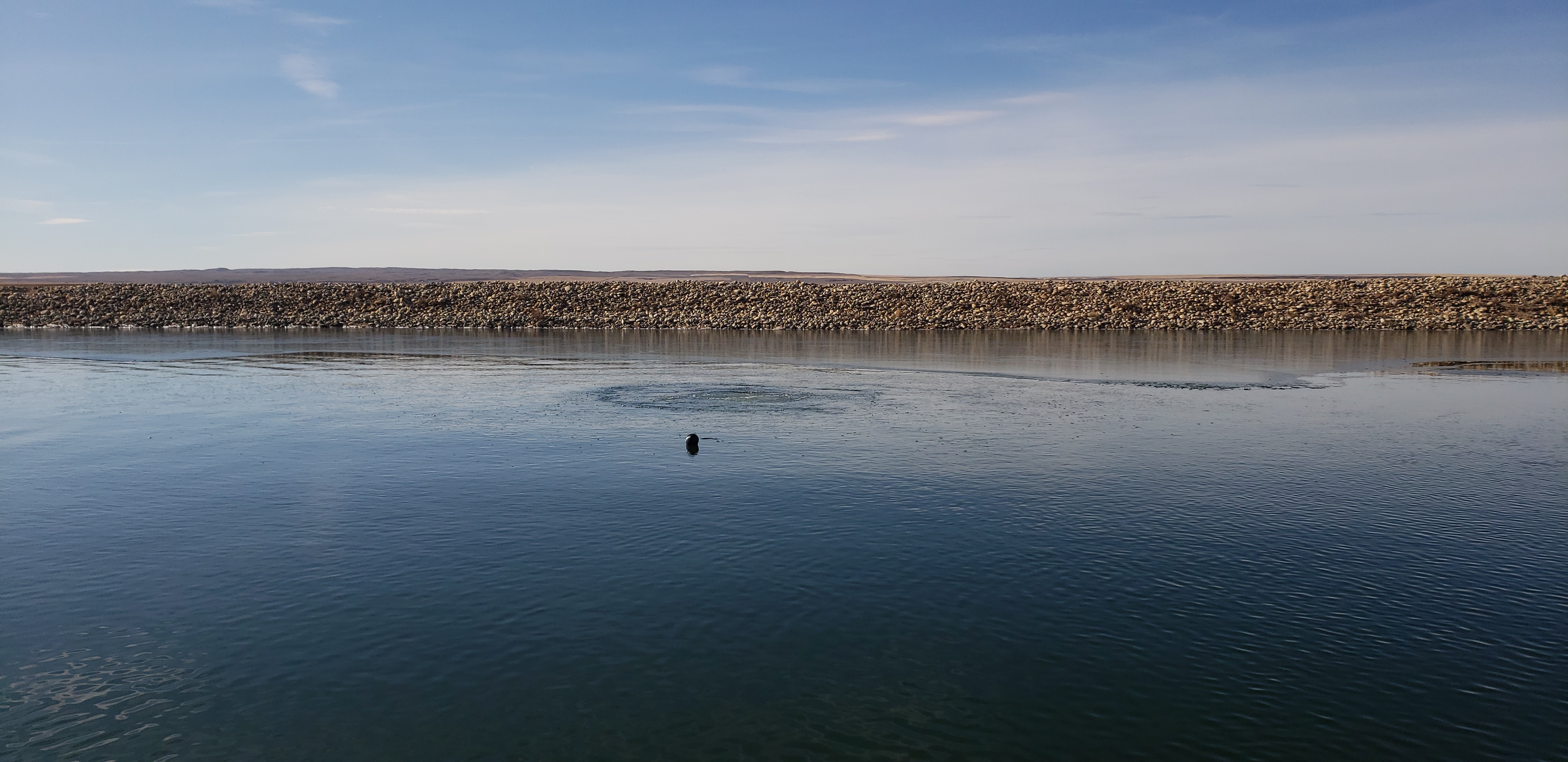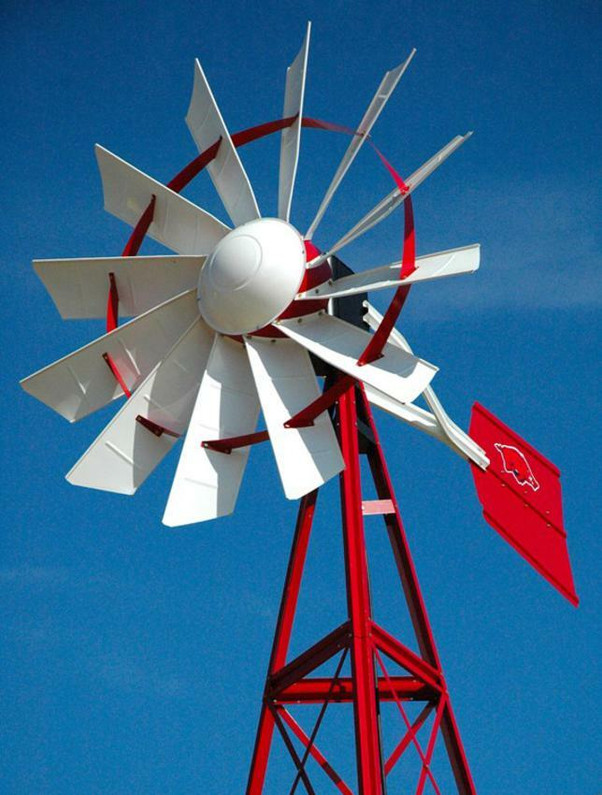Windmill vs. Electric Aeration: 10 Things to Consider when Choosing Aeration
Windmill versus Electric Aeration - 10 things to consider when choosing aeration

Technology has advanced so much that the once idealized windmill aeration system is becoming less and less popular. The industry leading electric aeration systems are superior to windmills, in so many ways that an electric aeration system is recommended if power is within 1500 feet. The cost of trenching power to the pond will be made up for in cost-savings and reliability of the high efficiency aeration system such as the Can-Air aeration system.
If you are looking to install an aeration system and are still deciding between a windmill or electric aeration system, take a look at some of they key points below our experts recommend you consider.
1.Efficiency: compare apples to apples.
Lets’s take the example of a windmill running for 12 hours in a 20 mph wind aerating a shallow pond. It produces 720 cubic feet of air. A 1/4HP teich-aire compressor will produce this same amount of air running for just 4 hours.
The electric compressor uses 1.1 kw during that time, so roughly $0.14 to run each day for a total of 4 hours (cost of $0.077 electricity and another $0.06 of additional charges on the electric bill) A windmill saves us 13.7 cents a day on power, however must be running triple the amount of time the electric compressor needs to run.
2.When do we require aeration for our ponds and dugouts?
Most larger ponds or dugouts require aeration from 9 pm to noon each day during the ice-free months. The average wind speed for midwestern states during august is 7 mph (20 mph is a good wind strength to be able to power a windmill). Most of this limited wind is during the time of day we do not require aeration. This makes windmills and some solar systems less efficient as a water management tool!
3.Windmill compressors only work when wind is blowing – Electric aeration can run 24/7 or be set on a timer.
This can lead to poor water quality and complete fish kills, particularly in the winter. No wind for a week in February or March often leads to total fish loss in older established ponds.
4.Inconsistent operation of windmills can lead to more complex problems.
Not only can poor wind conditions leave your pond un-aerated and your fish without oxygen, there can be problems when the wind does not blow for several days. When this happens, toxic gases that have built up such as hydrogen sulphate (deadly to rainbow trout at 0.03 ppm), phosphates and other nutrients are released from the bottom. When the wind starts to blow again we have a perfect algae feeding machine. This phosphate release can also cause blue-green algae outbreaks which can be toxic to wildlife, livestock and pets, in addition to causing fish kills.
5.Windmills require more labor intensive maintenance
Maintenance on windmills can be difficult as the maintenance is typically required on the windmill compressor which is 12-20 feet in the air. Most of the problems occur when it is very cold. Because of this we recommend installing a maintenance kit during the summer roughly every second year. Electric aeration compressor maintenance can all be done at ground level where compressor is housed as little as every 18 months.
6.Windmills cost more to purchase.
Windmills are typically more expensive in cost, especially as you often need multiple windmills to sufficiently aerate your pond. A ¼ hp compressor produces 6x the cubic feet of air per month as a windmill so you would require 6 windmills to be equivalent.
7.Windmills are expensive to ship!
It can be hundreds of dollars for LTL Trucking to ship the massive boxes the windmills come in. Alternatively, many of the electric aeration system (including our Can-Air Aeration Systems) can be shipped through US Postal service or even couriers like Purolator, FedEx and UPS. Pond Pro offers Free Shipping on all Can-Air Aeration!
8.Windmill aeration is not feasible at depths greater than 14 feet
Unfortunately windmill compressors take higher speed wind to start the blades turning as pond depth increases. This advice really holds true in the winter when the diaphragm is cold – without high speed wind you will not have any air produced by your compressor. For this reason we recommend installing the diffuser no deeper than 14 feet of depth.
9.Running windmills during the winter
If you’re planning to run aeration during the winter, a freeze control unit is necessary to prevent freezing of airlines in your windmill aeration system. This freeze control unit must be kept filled with anti-freeze liquid, increasing maintenance required for your system. This is eliminated in electric aeration systems if insulated airline is used
10.Windmills work better for clear ponds with very few organics.
There is less chance of stirring up nutrients from the bottom. Clearer ponds also typically have lower oxygen demand, meaning less aeration is required.
As ponds age, they use more oxygen. If you already have a windmill at your pond, you may require more windmills to keep it adequately aerated as it ages.
If you think a windmill would work for your pond, contact our experts to see if it is right for you.
Recent Posts
-
Building a Pond or Dugout? Consider This!
As the new year is upon us, you might start thinking about your spring and summer projects. If build …13th Sep 2024 -
Diagnosing Your Pond: Colour, Algae, Weeds
Our team likes to run through a standard set of questions including presence of algae and type, pres …13th Sep 2024 -
Bottom Diffused Aeration vs Fountain Aeration
When it comes to aerating a pond or lake, two popular methods are bottom diffused aeration and fount …9th Feb 2024




